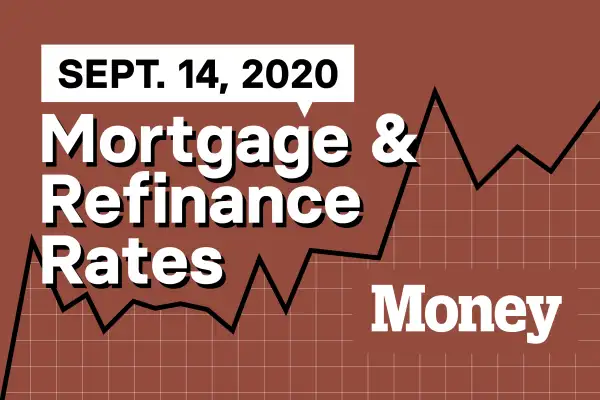Here Are Today's Best Mortgage & Refinance Rates for September 14, 2020

Borrowers with 700 credit scores were quoted an average rate of 3.556% to secure a 30-year fixed-rate purchase mortgage on Thursday, according to Money's most recent survey of over 8,000 lenders across the United States. At this credit score, roughly the national average, the average rate for a 30-year refinance was 4.428%. Our rates include discount points and are for borrowers putting 20% down.
| 30-year fixed-rate purchase mortgage |
| 3.556% |
| Rate of September 10, 2020 |
Borrowers in Illinois were quoted the lowest mortgage rates on Thursday—at 3.332%. Those in New Mexico saw the highest average rate at 3.784%. Nationwide, borrowers with the highest credit scores, 740 and above, were quoted rates averaging 3.141%, while those with credit of 640 or below were given rates of 4.888%—a 1.747 percentage point spread.
You may be able to negotiate a lower rate if you shop around or if you have other accounts with the lender. (Money's picks for the best mortgage lenders are here). Currently, some banks are hiking up advertised rates to keep demand in check, so you may be offered a lower rate if you reach out directly.
Freddie Mac's widely quoted Primary Mortgage Market Survey put rates at 2.86%, a new record low, with 0.8 points paid for the week ending September 10. The mortgage purchaser's weekly survey reflects borrowers who put 20% down on conforming loans and have excellent credit.
Refinance rates today
Money's most recent survey shows that the offered rate for a 30 year refinance for someone with a 740 credit score was 3.678% on Thursday. Last September, the average mortgage rate (including fees) was 3.922%.
| 30-year fixed-rate mortgage refi |
| 3.678% |
| Rate of September 10, 2020 |
A homeowner with a $200,000 mortgage balance currently paying 3.922% on a 30-year loan could potentially cut their monthly payment from $946 to $918 by financing at today's lower rates. To determine if it's worth it to refinance your mortgage, also consider the closing fees you paid on your current mortgage, how much your new lender is charging and how long you have left on your loan term. (Our picks for the best lenders for refinancing are here).
What else is happening in the housing market right now?
Median home sale prices increased 13% year-over-year, according to Redfin, reaching $319,178 for the week ending September 6. That's the largest increase the real estate brokerage has seen since October 2013. The average sale to list price ratio, which measures how close to asking price homes are going for, also reached an all-time high of 99.3%, up a full percentage point from last year.
“Home price growth this high is making the housing market especially difficult for first-time homebuyers right now,” said Daryl Fairweather, chief economist for Redfin. “Rising prices are just one more reason for people to leave expensive urban neighborhoods behind. The sudden rise of remote work has allowed homebuyers who are priced out of one neighborhood to expand their search to more affordable areas. In turn, they are pushing up home prices in those relatively affordable areas, causing more people to look to even more affordable areas, and so on. Price growth may slow in 2021, but even if it does, high prices are going to continue to make affordability a concern for buyers.”
At the moment, homes are still flying off the market. Nearly half of homes under contract had an accepted offer within two weeks, the fastest rate since Redfin started keeping track in 2012. Pending sales were up 28% year-over-year.
Meanwhile, new listings were also up last week, though not enough to make a significant impact on the housing inventory or affordability. The 9% increase from 2019 is the highest since 2015, but the overall number of active listings was down 28% from 2019.
Mortgage Term of the Week
Understanding the lingo can be key to avoiding mistakes when you are buying a home or refinancing your mortgage. For more read: Everything You Need to Know About Mortgage Rates in 2020
Appraisal: Whether you are applying for a purchase mortgage or refinancing, your lender will require that a licensed appraiser assess the property's current market value, by looking at the condition of the home and recent sales of similar homes in the area. The appraiser's verdict determines how much a lender will let you borrow for a specific property. If the appraisal comes in below your offer price you may need to renegotiate with the seller or come up with extra cash to cover the difference. It is smart to include an appraisal contingency in your purchase contracts, which means you can walk away without losing money if an appraisal comes in low.
